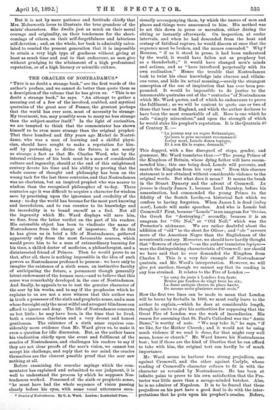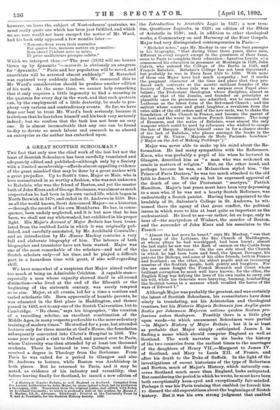THE ORACLES OF NOSTRADAM1JS.*
"THIS is no doubt a strange book," are the first words of the author's preface, and we cannot do better than quote them as a description of the volume that he has given us. "This is no doubt a strange book," he says. "An attempt to gather a meaning out of a few of the involved, crabbed, and mystical quatrains of the great seer of France, the greatest perhaps that the world has ever seen, must of necessity be strange. My treatment, too, may possibly seem to many no less strange than the subject-matter itself." In the light of curiosities, we are tempted to think that the commentator has shown himself to be even more strange than the original prophet. That three hundred and fifty years ago Michel de Nostre- dame, who was a man of learning and a skilful physi- cian, should have sought to make a reputation for him- self by pretending to divine the future, is not nearly so strange a fact as that Mr. Charles Ward, who by the internal evidence of his book must be a man of considerable culture and ingenuity, should at the end of this enlightened century devote his time and his ability to proving that the whole course of thought and philosophy has been on the wrong tack for the last three centuries, and that Nostradamus was no charlatan, but an inspired prophet who was nearer to wisdom than the recognised philosopher of to-day. Three centuries ago it was difficult to acquire a character for wisdom save by practising upon the ignorance and credulity of the many : to-day the world has become for the most part knowing and incredulous, and to run counter to its knowledge and its incredulity is to brand oneself as a fool. Not all the ingenuity which Mr. Ward displays will save him, we fear, from the latter verdict on the part of his readers. His ostensible object has been to vindicate the name of Nostradamus from the charge of imposture. To do this he has given us in brief a life of Nostradamus, gathered apparently only from the most favourable sources, which would prove him to be a man of extraordinary learning for his time, a skilled doctor of medicine, a philanthropist, and a disinterested friend of Princes. Then he would prove to us that, after all, there is nothing impossible in the idea of such powers as Nostradamus professed to possess : we have only to imagine the existence of a sixth sense, an instinctive faculty of anticipating the future, a permanent though generally latent endowment of the human race,—and to believe that this sense was remarkably developed in the case of Nostradamus. And finally, he appeals to us to test the genuine character of the seer by his works, and to say if the prophecies which he explains to us are not a sure witness that this author was in truth a possessor of the sixth and prophetic sense, and a man whose foresight only the most wilful and arrogant blindness can afford to ignore and deny. The life of Nostradamus concerns us but little : he may have been, in the time that he lived, both a conscious charlatan and a very decent and honest gentleman. The existence of a sixth sense requires con- siderably more evidence than Mr. Ward gives us, to make it even a question for idle discussion. But, as the author bases his vindication chiefly upon the event and fulfilment of the oracles of Nostradamus, and challenges his readers to say if they are not clear proofs of the seer's vision, we cannot but accept his challenge, and reply that to our mind the oracles themselves are the clearest possible proof that the seer saw
nothing at all. • Before examining the oracular sayings which the com- mentator has explained and submitted to our judgment, it is well to understand the process by which he supposes Nos- tradamus worked. Possessed of the sixth or propheticaense, "he must have had the whole sequence of vision passing clearly before his eyes, with some vocal utterances occa-
Oracles of Nostradamus. By 0. A. Ward. London Loadenhall Prose.
sionally accompanying them, by which the names of men and places and things were announced to him. His method was to set this down in prose or narration, either during the sitting or instantly afterwards. On inspection, at cooler intervals, and when he had descended from the heat and ecstasy of fatidical rapture, he would discern at once that the sequence must be broken, and the names concealed." Why?
Because, "if as it stood in prose, it had been understood by the world, it would have fallen not as prophecy but as a thunderbolt;" it would have changed men's minds and actions, and so "have interfered perpetually with its own realisation." Hence the trouble that Nostradamus took to twist his clear knowledge into obscure and villain- ous verse, and hide its actual meaning,—surely the strangest conception of the use of inspiration that has ever been pro- pounded. It would be impossible to do justice to the innumerable quatrains out of the "centuries "of Nostradamus which Mr. Ward quotes, and of which he endeavours to prove the fulfilment ; so we will be content to quote one or two of those that bear on England, and which the author declares to have been the most remarkable of all. Here is one which he calls "simply miraculous," and upon the strength of which he would stake his prophet's reputation. It is the Quatrain 40 of Century X. :—
"La Jeanne nay au regne Britannique. Qu'aura le pore mourant recommande Iceluy mort, Lonole donra topique, Et a son fils le regne, demand6."
This doggrel, with a fine disregard of stops, gender, and grammar, Mr. Ward translates thus :—" The young Prince of the Kingdom of Britain, whose dying father will have recom-
mended him ; this one being dead, Lonole will perorate, and snatch the Kingdom from his very son." Even this obscure statement is not obtained without considerable violence to the original words. But what does it mean ? It means the break in the Stuart Dynasty and the advent of Cromwell. La
jeunne is clearly James I., because Lord Darnley, before his
assassination, had commended the young Prince to the fidelity of the Scotch Lords,—a historical fact which we
confess to having forgotten. When James I. is dead (iceluy more), Lonole will make speeches. And who is Lonole but
Cromwell ? First, because "Lonole" is an anagram for 'Oxxigov, the Greek for "destroying ;" secondly, because it is an
anagram for "Ole Nol," or "Old Noll," which was the Protector's nickname. We are rather doubtful about the addition of "old" to the short for Oliver ; and " ole " savours more of the American Negro than the Englishman of the seventeenth century. Moreover, we should have hardly thought that "flowers of rhetoric "—as the author translates lopique- were the distinguishing characteristic of Cromwell : nor should
we have said that he ever demanded the Kingdom from Charles I. This is a very fair example of Nostradamus' quatrain, and Mr. Ward's interpretation. However, we will give yet another, though we cannot say that its reading is any less strained. It relates to the Fire of London :—
" Le sang du juste a Londres fera faute Brulez par foudres de vingt trois les six; La dame antique cherra de place haute, De mesme sects plusieurs seront occis."
How the first two lines can be made to mean that London will be burnt by fireballs in 1666, we must really leave to the author to explain,—which he does at considerable length,
though he omits to give his authorities for supposing that the Great Fire of London was the work of incendiaries. His reason for assuming that St. Paul's Cathedral was the "Antic Dame," is worthy of note. "We may take it," he says, "if we like, for the Mother Church ; and it would not be using
much violence if we read le dome, for that might very well mean, house or church." Mr. Ward knows his Nostradamus best ; but if those are the kind of liberties that he can afford to take with him, the original text can hardly be of much importance.
Mr. Ward seems to harbour two strong prejudices, one against Cromwell, and the other against Carlyle, whose reading of Cromwell's character refuses to fit in with the
character as revealed by Nostradamus. He has been at infinite pains to prove to his own satisfaction that the Pro- tector was little more than a savage-minded butcher. Also, he is no admirer of Napoleon. It is to be feared that these prejudices on his part have a good deal to do with the inter- pretations that he puts upon his prophet's oracles. Before, however, we leave the subject of Nostradamus' quatrains, we must really quote one which has been just fulfilled, and which we are sure would not have escaped the notice of Mr. Ward, had his book only appeared a few months later :—
" Nonaute-deux verra trois marmites
Par quatre fois, maisons mettre en poussiere : Sera sauve l'enfant avec sa mere, Et prise malfaiteurs presqne subite."
Which we interpret thus :—" The year (18)92 will see houses
blown up by dynamite "—marmite is obviously an anagram for "dynamite." "Paris and her population will be saved, and
anarchists will be arrested almost suddenly." M. Ravachol was captured very suddenly indeed. We commend this to Mr. Ward's consideration should he produce another edition of his work. At the same time, we cannot help remarking that it only requires a little ingenuity to find a meaning in the quatrain for every day in the week, and that each quatrain can, by the employment of a little dexterity, be made to pro-
phesy very various and contradictory events. So far, we have done our best to treat Mr. Ward's book seriously, because it is obvious that he has taken himself and his book very seriously
indeed ; but we confess that the task has not been an easy one. It is almost inconceivable that any one can be found to-day to devote so much labour and research to so absurd an enterprise as the author has embarked upon.

































 Previous page
Previous page